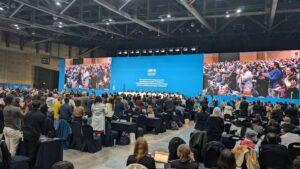By Steve Fletcher and Samuel Winton, University of Portsmouth
United Nations-backed talks for a global treaty to end plastic pollution wrapped up without an agreement in the early hours of Sunday, December 1. A new round of talks is expected in mid-2025.
Negotiations foundered over a cap on plastic production, restrictions on the use of certain chemicals in plastics and financial support to help developing countries switch to less polluting business models. These are staunchly opposed by the “like-minded group” of countries, including Saudi Arabia, Iran, Russia and other major oil producers with powerful advocates for the petrochemical and chemical sectors, for whom plastic offers a rapidly growing market.

(Samuel Winton)
While no deal was agreed in Busan, South Korea, where the talks took place, there was a feeling of renewed determination to create an ambitious and robust plastics treaty. In a memorable moment during the debate, a delegate from Rwanda spoke about the need for reductions in plastic production to confront mounting pollution, and was met with a standing ovation.
A delegate from Mexico read out a list of 95 countries that support a global phaseout of plastic products containing chemicals of concern to prolonged cheering by aligned delegations. The spirit of collaboration and multilateralism was tangible.
Why plastic talks faltered
During the late-night meeting, countries supportive of legal obligations to cut plastic pollution refused to accept a treaty limited to voluntary measures. The treaty must take action at each stage of a plastic item’s life cycle, they asserted. That includes reducing how much plastic is made.
The like-minded group prioritised better waste management and recycling, avoiding the fact that excessive overproduction of plastic is set to overwhelm even the most advanced systems.
Yet, observers also criticised the way in which Indigenous peoples were sidelined during the discussions, with no access to closed-door negotiations. The draft treaty text also failed to address gender equality and intergenerational equity.
Towards the end of the night, delegates agreed that the fifth intergovernmental negotiation committee would reconvene sometime in 2025 to continue developing the text of a treaty to end plastic pollution. Critically, delegates agreed that the next round of talks will build on progress made in Busan and not return to older drafts.
Many issues remain for consideration at the resumed negotiations in 2025. Here are three of the most significant.
1. Finance
Developing countries in particular need money to adopt business models to transition away from reliance on polluting single-use plastics. However, there is little consensus on how this money should be paid.
There is significant disagreement over whether to create a dedicated plastics fund, paid into by developed donor countries, or use existing mechanisms such as the Global Environment Facility.
The draft treaty text mentions fees or taxes on plastic production, which many delegates felt was essential for raising enough money to implement the global treaty. This is a red line for many plastic producer countries that see any such measure as punitive and imposing an unreasonable cost on trade.
2. Plastic production

The high-ambition coalition co-chaired by Rwanda and Norway considers measures to reduce plastic production essential, a position backed by considerable evidence.
Panama submitted an ambitious proposal requiring countries to adopt a global target to reduce the production of primary plastic polymers to sustainable levels once the treaty is agreed.
However, targets for the reduction of plastic production are another red line for oil-rich countries. In the closing plenary, statements on behalf of the like-minded group, and the Arab group and others made it clear that they would not accept any such measures.
3. Safety
Research shows that over 16,000 chemicals are used or present in plastics and, while safety information is lacking for over 10,000 of these, 4,200 are known to be of concern.
Effectively regulating the use of chemicals in plastics must be a cornerstone of any plastics treaty. However, despite proposals and the support of over 100 member countries for global phaseouts of harmful chemicals, the draft treaty text only has passing reference to chemicals.
Agreeing the text of a treaty to end plastic pollution is difficult. More time will not guarantee an ambitious agreement, but it does provide for further discussions to unlock consensus on this most critical of global challenges.
Steve Fletcher is a professor of ocean policy and economy and Samuel Winton is a postgraduate researcher, both at the University of Portsmouth.
This article is republished from The Conversation under a Creative Commons license. Read the original article. Banner photo: Plastic waste (iStock image).
Sign up for The Invading Sea newsletter by visiting here. To support The Invading Sea, click here to make a donation. If you are interested in submitting an opinion piece to The Invading Sea, email Editor Nathan Crabbe at ncrabbe@fau.edu.



